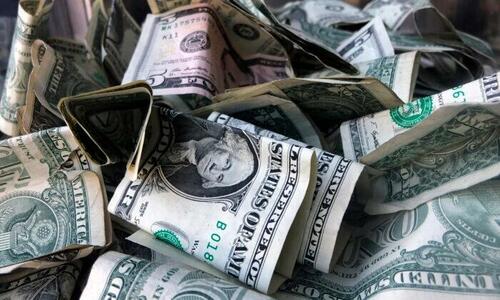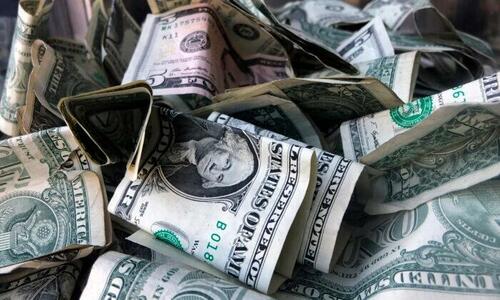If Cash Is King, Is The King Dying?
Authored by Gregory Copley via The Epoch Times,
Much of the world is at a pivotal stage in the future of money. If the physical symbolism of cash is removed or diminished, so too is individual freedom and much of the inspiration for entrepreneurship.
Proposals to make cash entirely digital gives a new meaning to governments as “controllers of the currency”; it makes them controllers of the lives of individuals.
Economists, politicians, and the avaricious tend to think that cold, hard cash – the physical kind – merely gets in the way of a deal which can be “interpreted” in many invisible currency forms, such as credits, promissory notes, and abstract assets.
Nonetheless, it is currency which reflects the prestige and power – or lack of them – of a society.
The bulk of the “value” or wealth of most societies today, however, is measured not in currency or hard assets, such as real estate or manufactured items, but in the abstracts of economies, such as creditworthiness. Our wealth, somehow, is “up in the air” out there, somewhere, to a far greater degree than at any time in human history. The old control mechanism of economic leaders, money supply (the physical amount of currency notes or coins in circulation, an aspect known as M1), no longer counts for much, a reason why central banks are less than effective in controlling economic trends.
How does this augur for the future stability of economies or the security of societies?
It first must be recognized that all currencies are “artificial” forms of value exchange. A dollar is worth a dollar if we believe it represents a dollar’s worth of value. And if inflation consistently reduces the purchasing power of that dollar (or euro, or pound, and so on), then at some stage the public will lose faith in it. Significantly, that “faith” parallels and is the handmaiden of trust in the government which issues the currency. It gets down to the reality that currency, governments, prestige, and influence—strength—are all given power only by the mind.
When a society loses its belief in the value of a currency or a government, or if a nation loses its willpower or confidence, then the currency or the government or the nation collapses. And when the overwhelming amount of wealth is measured digitally, rather than in the physical imagery of printed or minted money, it is difficult for it to be seen as anything other than transitory and ephemeral.
U.S. society has had such a sentimental association with its coinage—even the one-cent (penny) piece—that successive U.S. governments have been unwilling to risk public wrath by abandoning it. And this sentimentality has played a strong role in the limiting of inflation over the decades. That may be at an end as the U.S. government has toyed with moving to forms of a digital currency which could be used to control the movement and attitudes of all citizens. This has occurred in the People’s Republic of China.
Bluntly put, the digitalization of money is a major component in the infringement of freedom, given that digital currency is controlled not only by a central (governmental) authority, which can open or close access to funds, but is also dependent upon the absolutely unbroken delivery of electricity supply through a highly-complex structure of communications and computer links. Little wonder, then, that cryptocurrencies have gained some appeal, because they are, ostensibly, outside the grasp of governments. But they are not outside their dependence on electricity.
The appeal, then, of gold as a trading currency has increased in direct proportion to the distrust in governments, but, again, gold is an artificial currency in that it only represents value because of its global recognition and relative rarity. Gold cannot be eaten; nor can it, in itself, represent shelter or security. It is another abstract, supported as a psychological hedge against the fiat currencies of governments. Gold’s value is sustained by the fact that it is one of the “noble metals”—metals which resist corrosion—but it is only one of a number of such metals, all of which have some industrial value as well.
Where there is a significant overlapping between government-issued currencies and gold or silver coins is in the prestige given to the money by the appearance of a sovereign’s head on the paper or coin. This gets back to the concept of the psychological value of currency, tying it to the prestige of the sovereign, an image above party politics. This places great importance on the design and quality of the currency, to give it—particularly in the case of coins—an intrinsic as well as symbolic value.
The United States and other republics have had prestigious coinage, and these coins have usually had an iconic leader on them, and are minted continuously after the death of the figurehead (in the United States, such figures as Washington, Lincoln, or Benjamin Franklin). They have, like the new coins and banknotes now appearing with King Charles III on them, an imagery stimulus value; in short, prestige.
The world can no longer grow consistently without abstract forms of credit and currencies, given the reality that economic growth trajectories are driven by the ability to turn money over as frequently as possible.
So it is not that a return to a physical cash economy is desirable. Rather, it is important that the basis of a country’s economic stability is intrinsically tied to the prestige which its physical currency holds.
Inflation is—or was—held in check when the values of small coins were retained.
Many of us no longer bother to keep coins in our pockets. We relegate them to a storage jar in the kitchen. Some no longer carry paper currency. We rely on credit or debit cards, or their equivalent accessed through a cellphone (good only as long as it has electrical power). Much of this is a tribute to inflation, or the relegation of purchasing power to thoughtless electronic transactions, reflecting wealth in a world which lives only as long as the electrical spark survives.
A silver Maria Theresa thaler, however, will see you fed in areas where credit cards and modern currencies have no sway, in the mountains of Oman or Ethiopia, or the vastnesses of Arabia or Africa. Empress Maria Theresa, whose face is on the coin, ruled only from 1740 to 1780. She would have died contented if she had known how her prestige governed the lives of so many people more than 200 years after her death.
* * *
Views expressed in this article are opinions of the author and do not necessarily reflect the views of The Epoch Times or ZeroHedge.
Tyler Durden
Mon, 12/02/2024 – 14:05


